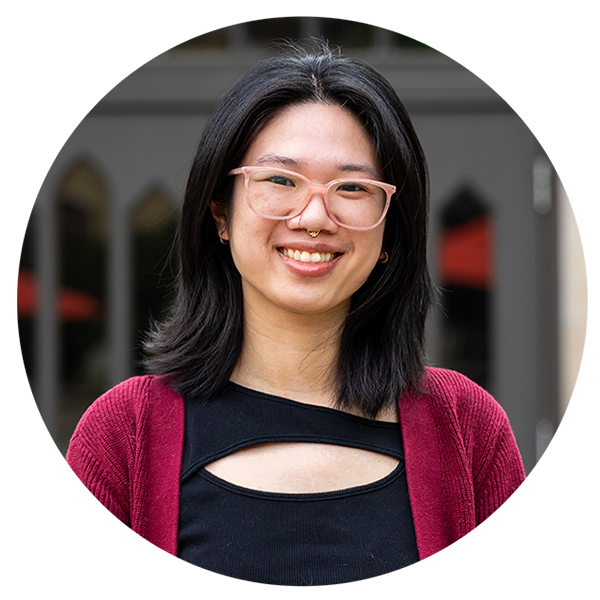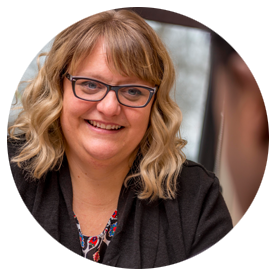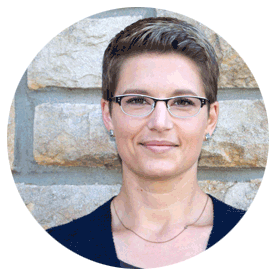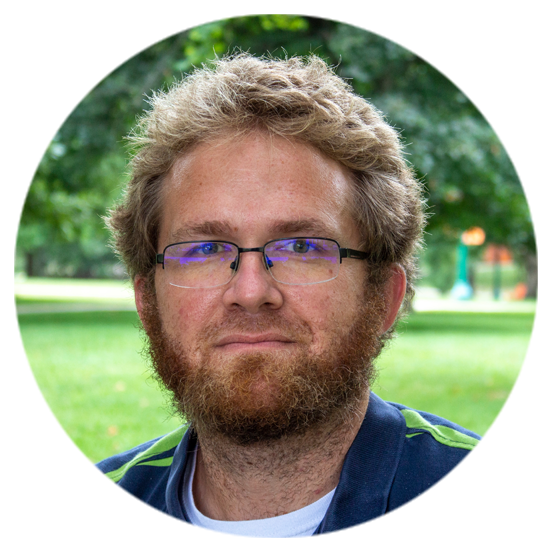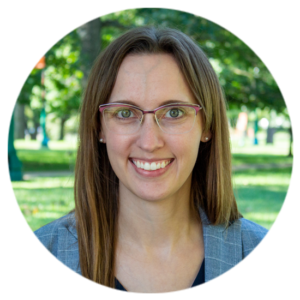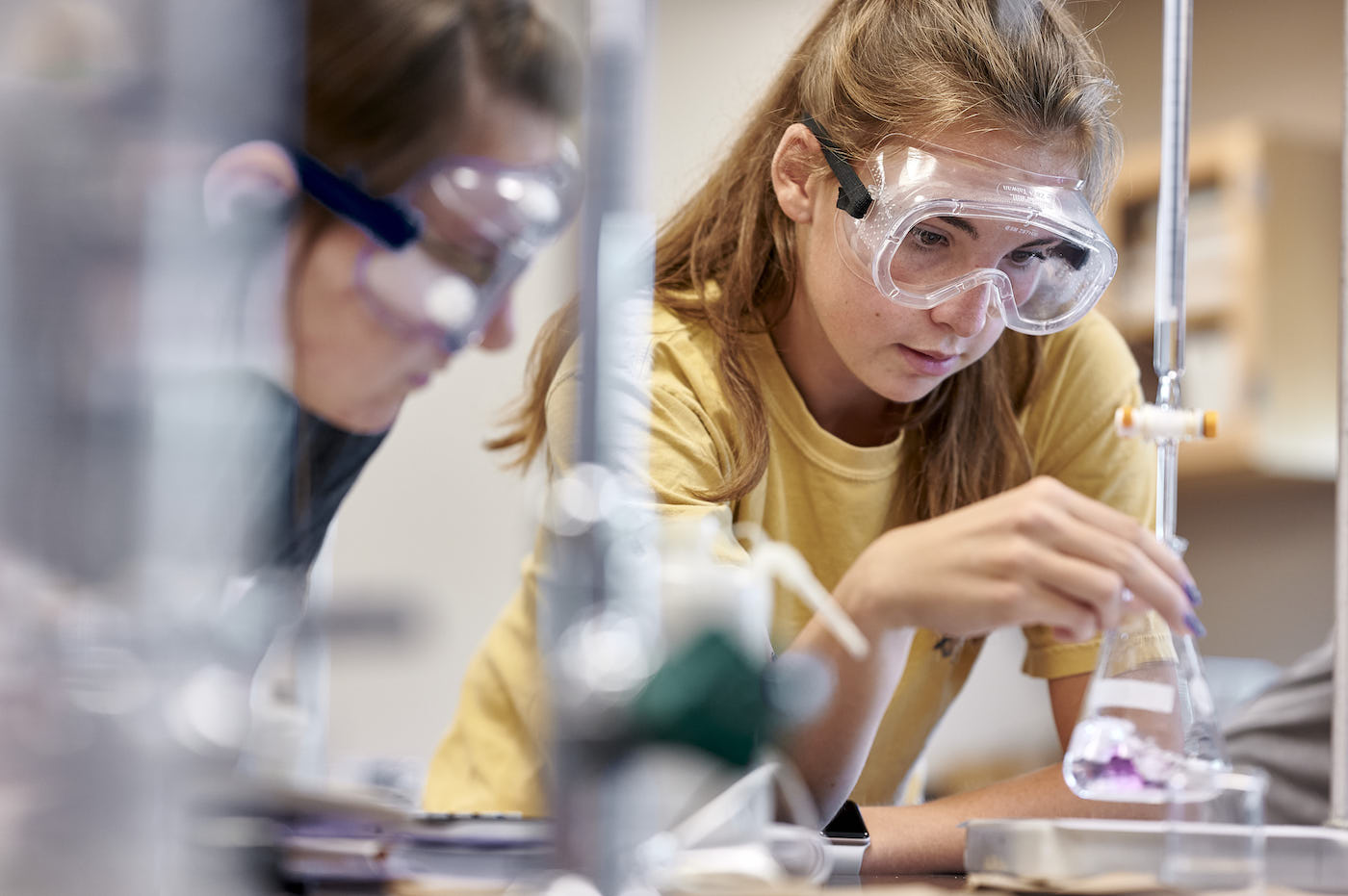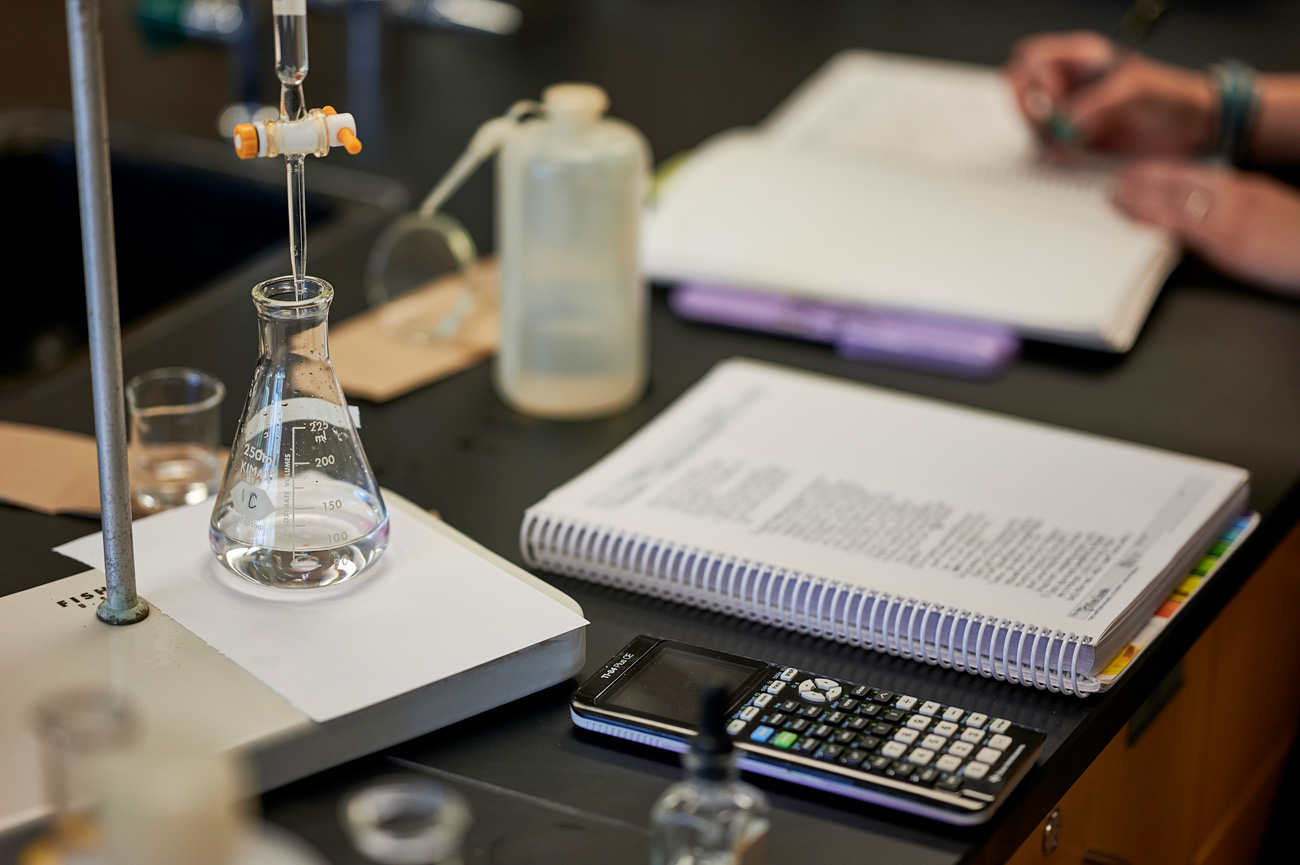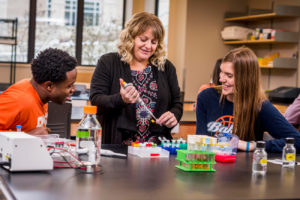BI 151 – Cell and Molecular Biology 3 hrs.
This course is an entry-level course for Biology majors. The course will address the relationship between structure and function of the major biological molecules (proteins, nucleic acids, carbohydrates, and fats) as well as the relationship between structure and function of cells and organelles. The students will also be introduced to the basic principles of molecular genetics and evolution. Corequisite BI 151L
BI 151 L – Cell and Molecular Biology Laboratory 1 hr.
The laboratory that accompanies BI 151. Corequisite: BI 151.
BI 152 – Genetics 4 hrs.
This course is an entry-level course for Biology majors. Genetics is the study of heredity at the population, organismal, cellular, and molecular levels. This course will focus on the Mendelian rules of inheritance in individuals and in populations. The molecular mechanisms that control cell division and gene expression will also be discussed. There will be three lecture/discussion periods per week, and one laboratory session per week where students will learn techniques used to study inheritance patterns. Prerequisite: BI 151.
BI 385 – Advanced Molecular Biology 3 hrs.
This course will allow students to expand on their previously acquired knowledge of genetics. Students will study classical and current experiments in molecular biology that are used to determine how the molecules involved in DNA replication, RNA transcription, and protein translation interact and function at the molecular level. Prerequisites: Junior status, BI 152, and CH 251.
BI 386 – Advanced Methods in Biochemistry and Molecular Biology 3 hrs.
This intensive laboratory course will give students the opportunity to carry out modern molecular experimental techniques such as recombinant DNA, electrophoresis, protein purification, blotting, and DNA sequencing. Today these techniques are utilized to answer questions in cell biology, molecular biology, and biochemistry. Students should have completed most other biology and chemistry requirements prior to taking this course so that they are prepared to both understand and design molecular experiments. Prerequisites: Senior status and BI 383 or 385 or CH 370.
CH 137 – General Chemistry I 3 hrs.
This course is an introduction to the principles and applications of inorganic chemistry. Topics include the structure of atoms and molecules; chemical stoichiometry; aqueous chemistry; atomic spectra, chemical bonding, and molecular structure; periodic properties; properties of gases, liquids, and solutions; and elementary thermodynamics. Demonstrated proficiency in algebra. Prerequisite: Math Proficiency, Phase I.
CH 137L – General Chemistry I Laboratory 1 hr.
This course is the laboratory component of CH 137. Prerequisite: Math Proficiency, Phase I. Co-requisite: CH 137.
CH 138 – General Chemistry II 3 hrs.
This course is a continuation and expansion of the material in CH 137. Topics include kinetics, equilibrium and the thermodynamics of spontaneity, and an introduction to elementary organic chemistry. Prerequisite: CH 137 and CH 137L. Co-requisite: CH 138L or permission of the instructor.
CH 138L – General Chemistry II Lab 1 hr.
This course is the laboratory component of CH 138. Co-requisite: CH 138 or permission of the instructor.
CH 251 – Organic Chemistry I 3 hrs.
This course is an introduction to the study of the structure and reactivity of organic compounds. Topics include bonding, resonance, acid-base theory, spectroscopy, stereochemistry, nomenclature, and named reactions. Prerequisites: CH 138 and 138L. Co-requisite: CH 251L or permission of the instructor.
CH 251L – Organic Chemistry I Lab 1 hr.
This course is the laboratory component of CH 251. Lab exercises will focus on topics related to the material covered in CH 251 and includes basic techniques, reactions, chromatography, and spectroscopy. Prerequisites: CH 138 and 138L. Co-requisite: CH 251 or permission of the instructor.
CH 252 – Organic Chemistry II 3 hrs.
This course is a continuation of CH 251. Topics include functional groups and reaction mechanisms. Prerequisite: CH 251 and CH 251L. Corequisite: CH 252L or permission of the instructor.
CH 252L – Organic Chemistry II Lab 1 hr.
This course is the laboratory component of CH 252. Lab exercises will focus on topics related to the material covered in CH 252 and builds on the topics and techniques introduced in CH 251L. Prerequisite: CH 251 and CH 251L. Corequisite: CH 252 or permission of the instructor.
CH 340 – Analytical Chemical Methods 3 hrs.
This course is an introduction to the standard methods of chemical analysis. The concepts of stoichiometry and equilibrium are emphasized along with the use of statistical analysis and computer software in evaluating data. Complementary laboratory experiments will provide practice in standard analytical chemistry procedures and techniques. Prerequisite: CH 252 and CH 252L.
CH 341 – Instrumental Methods of Analysis 4 hrs.
The theory and practice of physicochemical and instrumental methods of analysis are presented. Areas covered are spectroscopy, mass spectrometry, chromatography, electroanalytical methods, and areas of current interest. The course consists of three lectures and one laboratory session per week. Prerequisite: CH 252 and CH 252L.
CH 361 – Physical Chemistry I 3 hrs.
This course introduces the basic principles of physical chemistry. Topics covered in this course include thermodynamics, kinetics, quantum mechanics, and spectroscopy. Prerequisites: PC 126 or PC 226; and MA 172; and CH 252 and CH 252L. Corequisite: CH 361L is strongly encouraged.
CH 361L – Physical Chemistry I Lab 1 hr.
Lab exercises will focus on topics related to the material covered in CH 361. Corequisite: CH 361 or permission of the instructor.
CH 370 – Biochemistry 3 hrs.
This course is an introduction to the chemistry of biological compounds and their structure and reactions in living organisms. Topics include structures of amino acids, proteins, and enzymes; mechanisms of enzyme and coenzyme action; the structure and role of carbohydrates, lipids, and nucleic acids; metabolic pathways; and the biosynthesis of proteins. Prerequisite: CH 252 and CH 252L.
CH 470 – Advanced Topics in Biochemistry 3 hrs.
This course is a continuation of the topics introduced in CH 370, including structure and function of biological compounds, kinetics, enzyme mechanisms, metabolism, and information storage. Prerequisite: CH 370.
CH 470L – Advanced Topics in Biochemistry Lab 1 hr.
This course is the laboratory component of CH 470. Prerequisite: CH 370.
BI 410 – Senior Seminar in Biology 2 hrs.
This is the senior capstone course for all seniors graduating with a degree in Biology. The students will consult with the course instructor and project mentor in order to choose a topic that is relevant to their career interests and goals. Through research of the literature, each student will develop a significant paper that will demonstrate their ability to research, interpret, and write in their chosen field. Prerequisite: Senior status, Biology major. It is strongly suggested that students have completed at least two biology courses at the 300 level prior to taking this seminar.
OR
CH 491 – Chemistry Seminar 2 hrs.
This course is a survey of the chemical literature in which extensive use will be made of chemical abstracts and current journals. The student must select a topic of interest, research the literature, and present a paper. Prerequisite: Senior status
Supporting Course Work
MA 171 – Calculus I 4 hrs. Generally taught every semester
This course is the beginning course in calculus. Topics to be studied include functions, limits, continuity, derivatives, applications of the derivative, definite integral, and topics in differential calculus. Prerequisites: Students should have a strong background in algebra and trigonometry. This can be accomplished in a variety of ways, such as a high school pre-calculus course with trigonometry or both MA145 and MA146 with grades of C or higher. Students who have questions about their preparation should talk to a member of the math department. Students with strong algebra skills who need trigonometry may take MA146 as a corequisite. (Students planning on taking MA 171 in the spring should enroll in MA146 in the prior fall semester since MA 146 is generally only offered in the fall semester.)
MA 172 – Calculus II 4 hrs. Generally taught every semester
This course is a continuation of MA 171. Topics to be studied include more techniques of integration and applications of calculus, including sequences and series.
Prerequisite: MA 171 with a grade of C or higher.
PC 225 – General Physics I 4 hrs.
This course is a calculus-based introduction to classical mechanics. Key concepts include Newton’s laws of motion, Newton’s law of gravitation, conservation of energy and momentum, and rotational motion. These concepts are further explored in the laboratory sessions where basic data analysis techniques are also introduced. The course consists of three lectures and one laboratory session per week. Prerequisite or corequisite: MA 171.
OR
PC 125 Introductory Physics I 4 hrs.
This course provides an algebra-based introduction to mechanics, heat and thermodynamics, and wave motion. Key concepts include forces and Newton’s laws of motion, Newton’s law of gravitation, energy and momentum, heat and temperature, and sound. These concepts are further explored in laboratory sessions. The course consists of three lectures and one laboratory session per week. Prerequisite: MA 145 or permission of instructor.
PC 226 – General Physics II 4 hrs.
This is a continuation of PC 225 providing a calculus-based introduction to electricity and magnetism. Key concepts include electric force and charge, the electric field, Gauss’s law, the electrostatic potential, electrical energy, current, simple circuits, the magnetic force and field, Ampere’s law, and electromagnetic induction. The course consists of three lectures and one laboratory session per week. Prerequisite: PC 225. Prerequisite or corequisite: MA 172.
OR
PC 126 Introductory Physics II 4 hrs.
This is a continuation of PC 125, providing an algebra-based introduction to electricity and magnetism. Topics covered include electric charge, current, and simple electrical circuits. Basic ideas in optics and the physics of the atom are also covered. The course consists of three lectures and one laboratory session per week. Prerequisite: PC 125.
